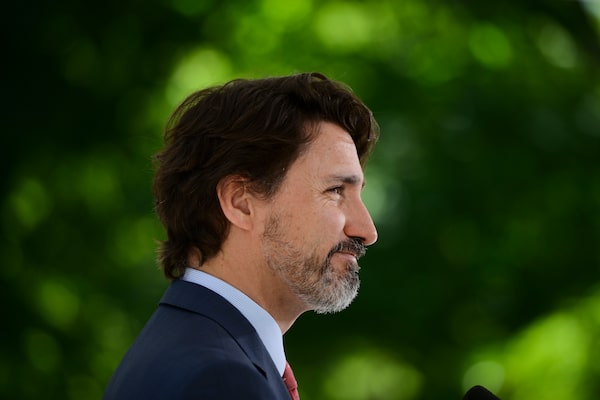
Prime Minister Justin Trudeau, seen here on June 16, 2020, said the seat is not an end in itself but rather a means to an end, as part of an effort to be more influential and have an impact on multilateralism around the world.Sean Kilpatrick/The Canadian Press
The Trudeau government’s four-year quest for a spot at the United Nations’ most powerful branch is set to come to an end this week as the world decides whether Canada deserves a seat at the table.
The UN Security Council election will begin on Wednesday in New York, where 193 member states of the United Nations will take part in an unprecedented physically distanced voting process to respect COVID-19 restrictions. The election marks a high-pressure moment for the Liberal government, which has made the campaign for a Security Council seat a cornerstone of its foreign-policy agenda since coming to power in 2015.
Speaking to reporters Tuesday, Prime Minister Justin Trudeau said the seat is not an end in itself but rather a means to an end, as part of an effort to be more influential and have an impact on multilateralism around the world.
“Regardless of what happens in the campaign, we are more engaged, we will continue to be more engaged on the world stage," Mr. Trudeau said.
Foreign Affairs Minister François-Philippe Champagne echoed Mr. Trudeau, saying Canada has “already won" in the sense that the government has re-established bilateral connections it had not “nurtured” in a long time. Mr. Champagne said he spoke to some counterparts during the campaign that had not heard from a Canadian foreign minister in nearly a decade.
Mr. Champagne arrived in New York on the weekend, following a 7½-hour drive from his home in Shawinigan, Que. Team Canada has set up a campaign “war room” in the residence of Marc-André Blanchard, Canada’s ambassador the UN; officials there are spreading the word about the need for Canada’s presence on the Security Council.
A UN race that underlined Canada’s foreign-policy complacency
“One of my key messages has been to amplify the voice of the most vulnerable – whether it’s nation states in the Caribbean, Pacific islands, in Africa – to say that Canada will amplify your voice not only at the UN Security Council but at the G7, G20, NATO, La Francophonie, Commonwealth,” Mr. Champagne said.
Mr. Trudeau and Mr. Champagne have made dozens of calls to their counterparts around the world in the weeks leading up to the vote. Mr. Champagne has continued those efforts in New York over the past few days, conducting physically distanced meetings with various countries’ representatives to the UN.
“I call them sidewalk encounters in the sense that you see the permanent representatives but they’re in their house and you’re on the sidewalk," Mr. Champagne said.
NDP international development critic Heather McPherson said the government’s outreach efforts look like a “last-ditch sprint at the end to engage with countries that we should be having conversations with regularly."
Although the Security Council election is conducted by secret ballot, some countries, including Jordan and Senegal, have already publicly pledged their support for Canada. Sources said the United States and Israel are also expected to vote for Canada.
However, another major power – India – is unlikely to support Canada, according to a report in the Hindustan Times. India is also running for a seat and is expected to win, as it is the only candidate for the single Asia-Pacific seat.
Canada is competing against Norway and Ireland for two rotating non-permanent seats in the Western European and Others group for 2021-22. UN experts agree Norway is the front-runner, leaving Canada and Ireland in a likely competition for the second seat.
Adam Chapnick, a professor at the Royal Military College of Canada and author of Canada on the United Nations Security Council, said the high-stakes race puts Mr. Trudeau’s international brand at risk but, if Canada wins a seat, the risk will have been worth it.
“It is much easier to represent Canada on the world stage when you have a seat on the Security Council," he said. "Countries are more interested in what you have to say and you have better access to people in countries with real influence.”
Conservative Leader Andrew Scheer accused the Liberals of selling out Canadian principles and said it has “cozied up to dictators” to win a seat, pointing to the government’s failure to list Iran’s Islamic Revolutionary Guard Corps as a terrorist entity.
As of Monday, Canada had spent $2.346-million on the Security Council campaign. The figure does not include staff salaries, which come from existing budgets.
Canada last sat on the Security Council in 1999-2000. The former Conservative government withdrew Canada’s candidacy for a Security Council seat in 2010 when it became clear Canada would lose to Portugal.
Our Morning Update and Evening Update newsletters are written by Globe editors, giving you a concise summary of the day’s most important headlines. Sign up today.